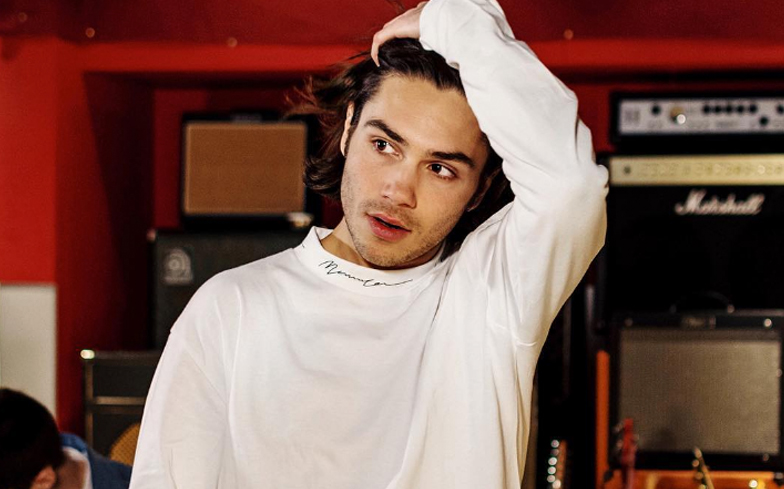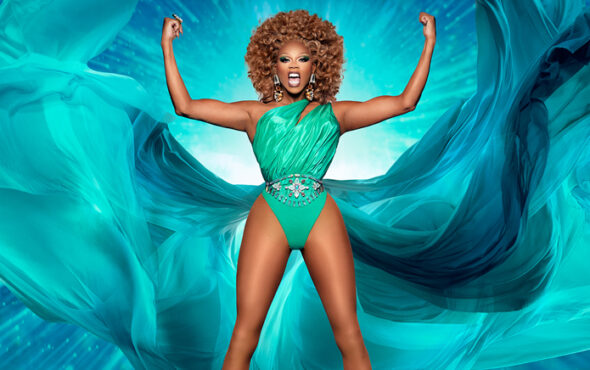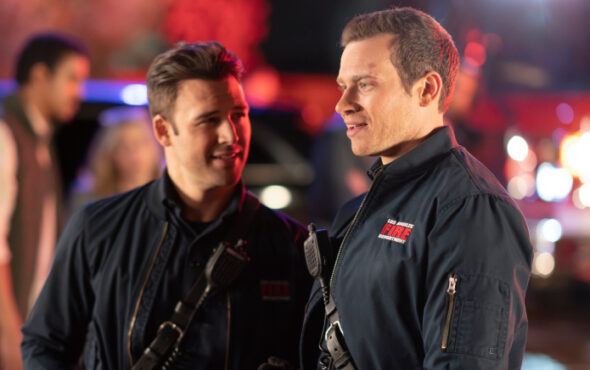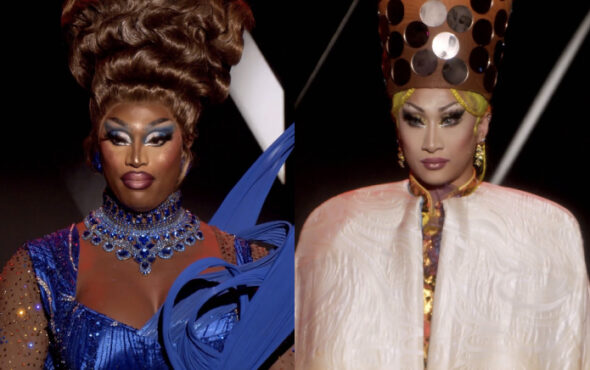
When you’re armed with a storming LGBTQ dance anthem, what better way to give it its grand live debut than with a huge show at Pride in London?
That’s exactly what George Shelley did with his new single Technicolour – a song he tells us got him through a very dark period of his life.
Having struggled with being fully comfortable with his sexuality while being thrust into the spotlight by The X Factor and the following success with Union J, as well as placing second on I’m A Celebrity! Get Me Out Of Here in 2015, the 24-year-old admits he was too scared to come out.
Last year, George’s family faced tragedy when his sister died after being injured in a car accident. The singer faced a tough period of grief – as well as confronting his own “mental health complications” – and locked himself away in his bedroom where he had built himself a studio.
Music, he tells us, helped him through the healing process, and has resulted in new material which he plans to release in the future.
Before that, he has a new BBC Three documentary in the works, as well as promoting his new anthem Technicolour – a rebellious track that hears him shout about his sexuality loudly and proudly for the first time in his career.
Gay Times caught up with George to talk about his emotional comeback, the importance of visible role models for LGBTQ youth, and why he “can’t be arsed about looking too pretty” anymore.
Hi George! How are you feeling after your big music comeback at Pride in London?
I’ve spent so long building up to the Pride performance and getting everything ready. You know when you kind of have the whole term at school and then you get to the holidays and you get ill because you’ve been working so much? It’s kind of like that. I worked full steam and then I put the brakes on and now my body has just gone into shut down mode, so I’m a bit poorly but I’m good. It’s been a week of getting my feet back on the ground, and I haven’t managed to soak in everything that has happened really.

© Mike Marsland/WireImage for Pride In London
I can imagine it’s been quite overwhelming.
I’ve not been very well over the last year since I lost my sister, and I’ve not really worked much. I built a studio in my bedroom and basically taught myself how to produce. That process for me was a really big part of my healing process – to get these emotions out, and this confusion on paper, with music. That was a massive healing process for me. I didn’t leave my house for ages, and so to then be on stage in front of so many people, singing a song I’ve been working on for a long time, it was just a complete polar opposite. I was used to being in a really small room and not seeing many people, to all of a sudden back at it and seeing everyone. I was like, ‘Woah, this is the feeling I used to get.’ I’ve never actually felt the feeling I felt on stage at Pride in my whole life.
You had a fantastic reaction from the crowd…
Everybody was there for a reason. You could feel it in the air. The energy was electric. For me, I’ve never performed a song to an audience before where I felt the connection so strongly and instantly. Everybody knew what it was about, what the reason for the song was, and how much it meant to me. I’ve never sung a song that’s been so personal. It’s a completely different feeling to what I’ve done before on stage. I’m still kind of coming down from it all. I’m still getting loads of comments coming through. I came off stage and I felt so proud. Everything that I’d worked towards had happened, and I was like, ‘This is it – I feel like I’m through the other side of a pretty bad time.’ It felt really good.
You wrote a great message to your fans on Instagram when the single was released – why was it important that you put that out there?
To come back with a song that’s so personal in its lyric and in its message, and even in the tone that I’m singing it in. I’m shouting this song, basically. I’m rebelling against my childhood, growing up in a small town where nobody really understood what being gay was. I didn’t feel comfortable to come out. Even after being in the music industry for four/five years, I still wasn’t comfortable with my sexuality. I’ve had my lid locked on for a long long time. This song is basically me opening up and it’s a big explosion of me coming out. When I lost my sister I realised that life is just too short for hiding stuff away, and not speaking your truth. I just want to make sure that whatever I do next in life, I’m me and I’m not having to hide anything about myself. I go back to my hometown now and I’m meeting kids who are coming up to me like, ‘We love Technicolour and its message.’ We don’t get Pride in Clevedon. We have Bristol Pride, but I didn’t know what Pride was when I was growing up. So for me to be able to spread a message to those kids who are growing up, or anyone out there – there are adults who are still not comfortable with their sexuality.
It’s damaging, because the pressure can cause a lot of mental health issues. That’s kind of what I’m touching upon in the documentary I’m making with BBC Three at the moment. It’s obviously about the trauma of losing my sister and the grief, but I’m also taking it back to when I was younger, being on The X Factor, going into the jungle, and not being able to speak about my sexuality openly because I was scared. Now I just haven’t got time for that. I can’t be arsed to worry about looking too pretty because I’m having to be in a polished boyband. The single artwork for Technicolour, the photo I’ve chosen to use I’ve got my tongue out and it’s got loads of colours everywhere, and it’s just so in your face. That’s what I wanted – I wanted something that had a bit of a message to it. It’s a rebellious photo that I took with Damon Baker. I wanted to do something that really speaks the message of the song, and this is just rebellion. This is me coming back as me. I wanted it to be aggressive, because it’s a big ‘fuck you’ in a way to a lot of people. A lot of people told me I wasn’t able to… when I came out a couple of years ago, I was told that being a solo artist is incredibly tough, and that maybe I should think about another career path – hence why I started presenting and stuff. People told me that you can’t… all of those things that I was having to hold back before, I’m now shoving it in people’s faces.
Looking back at all the Pride footage and having Ian McKellen on the same stage… he’s my idol! And has been for years. When I was a kid and I was watching Lord of the Rings, obviously Gandalf is one of the top characters, but I had no idea growing up that Ian McKellen was gay. It wasn’t actually until a few years ago, and he’s been a massive activist for the community. He’s always been outspoken about his sexuality, and to see how much work he did, and it didn’t even reach me as a kid, I want to make sure that that message is getting spread even further. I want to carry on doing the great work that people like Ian have done in the past. I’m just enjoying being me for a bit, because I’ve not been able to for a very long time.
Surely being a visible role model for LGBTQ youth is the most important thing people with a platform can do?
Exactly. There are still people in the industry and within society that are not comfortable with their sexuality, and they’re hiding it. So to have these role models who are breaking barriers… Everyone has that very stereotypical image of homophobia and sexuality, but with the androgynous models that are coming through, it’s just taking a massive step forward in the right direction. I feel like the more people that can come out and be themselves and speak their truth, it’s just going to give so many kids around the world a safe place. The more role models we see do this, the better it will be. There are gay football players, but they don’t feel comfortable being themselves. In 10 years time, I think the world is going to have changed quite a lot once we’ve got this new generation coming through.
Homophobia isn’t always verbal and physical abuse, there’s those unfortunate attitudes where someone considers another person ‘looking too gay’ or ‘sounding too gay’ as if it’s a problem.
Especially in the music industry. For example, with the Technicolour single cover, the amount of colour there is on that some people were like, ‘Oooh it’s too gay – it’s too much like the rainbow flag’. It’s those sort of things. It’s knitted between the lines of life. We need to stamp that out. We need to make some changes.

Is Technicolour a good indication of what’s to come?
Kind of. Technicolour was a song that helped me out of a couple of months during a dark period. Like I said, I built a studio in my bedroom and taught myself how to produce. My friend Emily would kick me back into my bedroom if it wasn’t sounding good, and it was months and months of me not leaving my bedroom just teaching myself. The songs I was writing are a lot darker than Technicolour. They are a lot heavier in their meaning and message. They are very personal. Technicolour is very personal as it speaks about my sexuality and my truth, but the other songs are a lot… I don’t know how to put it… Obviously I lost my sister and there were a few other things that happened throughout the very important stages of growing up which I’m going to touch upon in the documentary, and it’s not been easy.
When I talk about my mental health complications, this isn’t a case of my just saying it because everyone’s talking about mental health at the moment, I’ve really had to sort myself out. Part of that was the music I was writing. Coming out of that dark place and getting the right help I needed. I wouldn’t have been able to have this conversation with you six months ago. This has all been a very big healing process for me. Even performing Technicolour at Pride was a milestone for me. I had to set myself the challenge of getting healthy enough – mentally and physically – to be able to perform. All of these songs that I’ve written, they’re like a journey.
Having been in Union J and just been given songs by your label to perform, this completely different process you’ve just gone through must have given you a newfound respect for the power of music?
Completely. I’ve not done this to chart. I’ve not done this to get millions of views and streams. This was a personal journey I wanted to share with people who want to listen. I wanted to help other people who are in a similar position to me. I did graphic design at uni, so I’m doing all of my artwork. When you can connect the two things – the music and the art – that’s what’s special. When you have too many cooks involved, the music and the art get torn away from each other and you lose the message of a song. That’s when you end up with an empty track that doesn’t speak to many people apart from a very specific audience of young girls, because that’s who pays for that music.
The label that I’ve signed to are kind of letting me get on with it, which is exactly what I want. The demos I’ve knocked up in my bedroom are being taken to the bigger producers. Alex Beitzke and Bradley Spence did Technicolour and they beefed it up. This is a completely different journey. After just releasing one song, I feel like I’ve experienced music in a completely different interstellar way compared to what I’ve done before. I don’t think I’m ever going to let that go. I can see how much this has helped me and I don’t ever want to stop making music, and I don’t think I’ll ever have to. The set up I’ve got now, I can just keep releasing music as long people are listening. I’m not worried about it charting or getting radio play, as long as the music I’m making has a message and helps others, I’m going to keep doing it. I’m feeling good.
George Shelley’s new single Technicolour is available to download and stream now.



